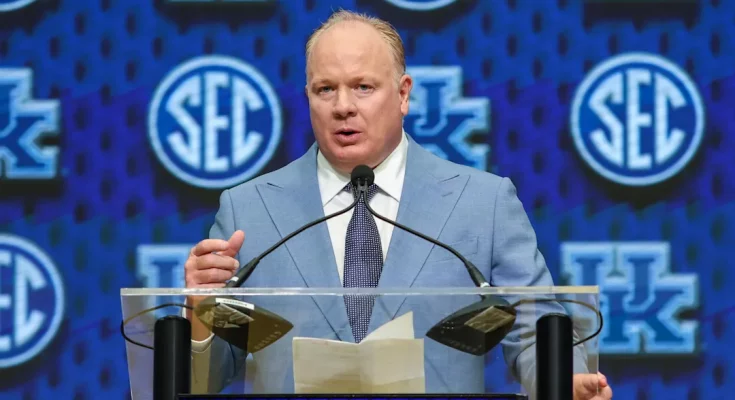Mark Stoops has never been one to shy away from the grind. In a college football landscape that shifts rapidly—with players jumping into transfer portals, NIL deals altering motivations, and coaching tenures growing increasingly short-lived—Stoops remains one of the few constants in the Southeastern Conference. His work at Kentucky has been nothing short of transformative, turning a program once known for mediocrity and fleeting moments of success into a consistent force in the SEC East. Yet even for a coach of Stoops’ caliber, maintaining a disciplined culture over time is no small task. After a few seasons where Kentucky’s identity began to wobble—marked by inconsistencies on the field and whispers of internal laxity—Stoops is now taking it upon himself to re-center the program. His focus: re-establishing the kind of accountability, toughness, and discipline that once made Kentucky football so formidable under his leadership.
There’s no mistaking that Kentucky’s rise under Stoops was rooted in a culture of discipline. When he took over the program in 2013, the Wildcats were coming off a 2-10 season and hadn’t had a winning season since 2009. They were routinely blown off the field by SEC foes and struggled to compete for in-state talent, let alone national recruits. Stoops approached the rebuild with a laser focus on physicality, player development, and mental toughness. He understood that Kentucky would never be the flashiest team in the conference, and instead focused on doing the little things well: executing assignments, avoiding penalties, finishing tackles, and controlling the line of scrimmage. Over time, that identity took root. By 2018, Kentucky had turned in a 10-3 season, culminating in a Citrus Bowl victory and a final AP Top 25 ranking. The Wildcats were no longer a pushover—they were a hard-nosed, fundamentally sound football team that punched above its weight.
But culture isn’t something that sustains itself. As Stoops himself has noted, culture is either growing or eroding—there is no in-between. And over the past couple of seasons, signs of erosion began to surface. Kentucky’s 7-6 finish in 2022 was disappointing by recent standards, and though the 2023 campaign featured flashes of potential, it too ended with unmet expectations. More alarming than the record, however, were the ways the Wildcats faltered. Penalties became more frequent. Players missed assignments in crucial moments. There were lapses in effort and discipline, particularly in close games. Though Kentucky remained competitive, the gritty edge that once defined the program seemed dulled. Stoops, a coach with a defensive background and an old-school mindset, recognized the symptoms. And more importantly, he recognized the cure.
Getting a disciplined culture back into a program doesn’t happen overnight. It’s not as simple as running more laps or shouting more in practice. Stoops understands that it starts at the top—with coaching, communication, and consistency. One of his first steps in this cultural reclamation was evaluating the structure of his staff. Over the offseason, Stoops made a series of staff changes aimed at infusing new energy and focus into key position groups. He didn’t just want technical expertise—he wanted teachers and motivators. Coaches who would hold players accountable not just for execution, but for effort, preparation, and focus. In team meetings and position rooms, the language shifted. Discipline wasn’t a buzzword anymore; it was the expectation.
The next step was ensuring that the standard of discipline extended beyond the practice field. Stoops and his staff have increasingly emphasized accountability in all areas—academics, strength and conditioning, film study, nutrition, and conduct. At Kentucky, players are now held to a renewed standard of excellence across the board. And that’s by design. Stoops believes that habits formed off the field mirror the ones formed on it. A player who cuts corners in the classroom or skips a lift is more likely to miss an assignment on third down. To combat this, Kentucky has reinstated its player leadership council and ramped up internal competition. Every rep matters, and senior players are tasked with modeling the behaviors the program demands.
Recruiting, too, plays a critical role in reinforcing culture. Over the years, Stoops has built a reputation as one of the most strategic recruiters in the SEC. While Kentucky may not always land five-star prospects, Stoops consistently identifies and develops high-upside players who fit the program’s ethos. Now, more than ever, the Wildcats are looking for recruits who embody discipline, humility, and a willingness to work. It’s no longer just about speed and size; it’s about character. Kentucky is doing deeper evaluations of players’ backgrounds, work ethic, and coachability. Stoops has reportedly turned away talented recruits who didn’t align with the program’s cultural goals. That kind of selectivity speaks volumes. It tells current players and incoming freshmen alike that the locker room is sacred ground—earned, not given.
Another key factor in restoring a disciplined culture is player development. Kentucky has long been known for turning three-star prospects into NFL talent, and Stoops wants to double down on that formula. In recent months, the program has invested heavily in player development resources, including enhanced film study tools, individualized coaching sessions, and mental performance training. The idea is simple: disciplined players are developed, not born. By teaching players how to analyze film, self-correct mistakes, and build good habits, Stoops is equipping them to play smart, disciplined football. It’s not enough to tell a linebacker to “maintain gap integrity”—they have to understand the why, the when, and the how. When players are educated and empowered, they make fewer mental errors, and that’s what Stoops wants to get back to.
Of course, culture is not only internal—it has to withstand external pressures. The era of NIL and transfer portals has created new challenges for coaches trying to instill discipline. Players today have more freedom and leverage than ever before. While that empowerment is undoubtedly positive in many respects, it can also disrupt team cohesion and accountability if not managed carefully. Stoops has approached this new era with realism and adaptability. He doesn’t fight the change—he navigates it. Kentucky has created NIL guidance programs and emphasized the importance of team-first mentality even amid individual opportunities. Stoops reminds his players regularly: personal success follows team success. If the team is winning and playing disciplined football, everyone benefits—whether through draft status, NIL deals, or exposure.
Stoops has also leaned into transparency as a cultural cornerstone. He meets regularly with players to discuss not just football but life—expectations, goals, struggles. He wants his players to know where they stand, what’s expected of them, and how to grow. By creating an environment of honest communication, he fosters mutual respect. That kind of transparency also applies to roles and responsibilities. Players are no longer guessing about depth charts or playing time—they’re shown clearly what they need to improve. That clarity is a powerful motivator. When expectations are clear, and the path forward is visible, discipline becomes a byproduct of structure.
One of the more understated aspects of Stoops’ culture reset is how he handles adversity. In previous years, when Kentucky stumbled, they sometimes allowed one loss to become two. Momentum slipped away too easily. This offseason, Stoops has preached the importance of resilience—emotional discipline, not just tactical discipline. He wants his team to respond better to setbacks, to stay locked in when things don’t go their way. That’s not just motivational rhetoric—it’s a tactical imperative. In the SEC, every game is a battle of attrition. The teams that can stay mentally sharp through the ups and downs are the ones who win close games. Stoops is instilling a culture where no moment is too big, and no mistake too costly to recover from.
Fans, alumni, and former players have taken note of the cultural pivot. Attendance at spring practices increased, and reports from inside the program suggest that this year’s group is more focused and cohesive than in recent memory. Veteran players like Trevin Wallace and Deone Walker have emerged as vocal leaders, echoing Stoops’ message and reinforcing it among younger teammates. That internal leadership is vital—it shows that the culture is taking root organically, not just being enforced top-down. Stoops has often said that the best teams are player-led, not coach-led. This year, he might finally have that again.
If there’s one thing Stoops understands deeply, it’s that success in the SEC is fragile. The difference between 10-3 and 7-6 is often a few missed tackles, a blown assignment, or a momentary lapse in discipline. That’s why he’s attacking the culture rebuild with such urgency. He knows that Kentucky has the talent to compete. What they need now is cohesion, consistency, and commitment to the little things. Stoops isn’t promising flash. He’s promising fundamentals. And in college football, where hype often outpaces substance, that’s a refreshing stance.
The upcoming season will be the true test. Kentucky’s schedule, as always, is grueling, with early conference matchups and a closing slate that could decide the direction of the program for years to come. But unlike in recent seasons, Stoops is approaching the campaign with a renewed sense of control. He’s not trying to reinvent Kentucky football—he’s trying to get it back to what made it work in the first place. And that begins with discipline. It’s the bedrock of who Kentucky was at its best under Stoops and who it must become again.
Whether this culture reset results in a breakout year or a slow return to form, one thing is clear: Mark Stoops is fully invested. Not just in wins and losses, but in the daily grind of shaping young men and building something sustainable. In an era when many coaches are looking for shortcuts, Stoops is doubling down on the long haul. He’s betting that discipline, done right, can be a competitive advantage. And if history is any guide, that’s a bet worth watching.



